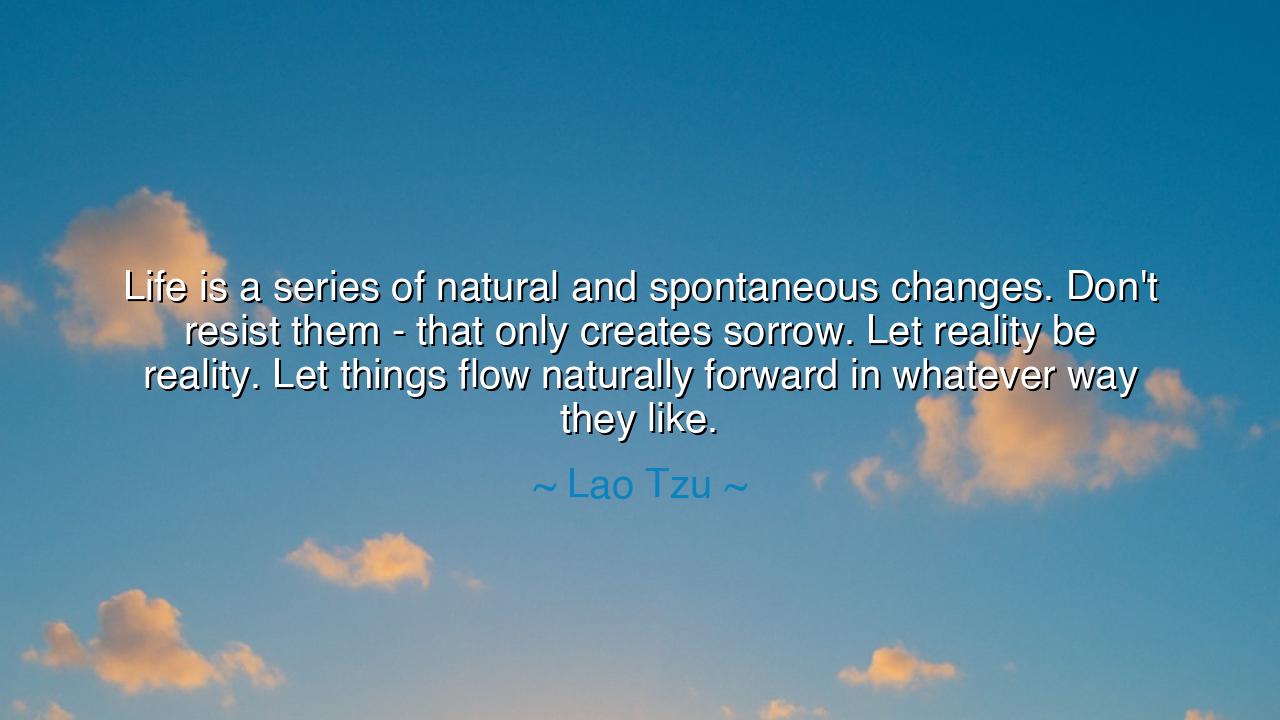
Life is a series of natural and spontaneous changes. Don't resist
Life is a series of natural and spontaneous changes. Don't resist them - that only creates sorrow. Let reality be reality. Let things flow naturally forward in whatever way they like.






“Life is a series of natural and spontaneous changes. Don’t resist them — that only creates sorrow. Let reality be reality. Let things flow naturally forward in whatever way they like,” spoke Lao Tzu, the sage of ancient China, whose words ripple across time like the gentle current of a river. In this truth lies the very heartbeat of the Tao, the Way — the path of harmony that flows through all things. It is not a call to passivity, but to wisdom; not to surrender in defeat, but to align oneself with the great rhythm of existence. To fight the current of life is to exhaust the soul; to flow with it is to find peace beyond measure.
The origin of this teaching rests in the heart of the Tao Te Ching, the sacred book of Lao Tzu — a collection of verses that breathe simplicity, humility, and surrender. The old master taught that life, like water, moves of its own accord, always seeking the lowest place, always patient, always yielding — yet nothing in the world can overcome it. Those who understand the Tao do not clutch at permanence, for they know that all things — joy and sorrow, gain and loss, birth and death — are but passing forms of the same eternal motion. To resist change is to resist the very law that sustains life itself.
In every age, mankind has feared change, clinging to what was, and suffering when it slips away. Yet change is the breath of the universe. The seasons turn without our command, rivers carve their paths without our consent, and the stars wheel silently through the heavens, indifferent to our plans. Lao Tzu teaches us that to live in harmony with reality, we must become like the reed that bends with the wind — flexible, not rigid; yielding, not broken. He who resists the wind snaps in pride; he who flows with it stands through the storm.
Consider the story of Emperor Ashoka of India, a ruler fierce in conquest who drowned his heart in the blood of war. After the Battle of Kalinga, he walked among the corpses of his enemies and felt only sorrow. The power he once worshiped turned to ash in his hands. In that moment of ruin, he ceased to resist the truth of change — that even empire must bow before compassion. He embraced Buddhism, seeking peace through gentleness rather than domination. Ashoka became a living embodiment of Lao Tzu’s wisdom: he let reality be reality, and in accepting impermanence, found the freedom to rule wisely and kindly.
Resistance, Lao Tzu tells us, is the source of suffering. When we cling to the past, when we demand that the world conform to our desires, we set ourselves against the current of the Tao. But when we release our grip, we discover that life carries us where we need to go, not where we insist on going. The one who lets go is not lost; he is carried. The ocean that seems to drown the fearful swimmer is the same ocean that cradles the one who floats.
This teaching does not mean that one should be idle. Rather, it invites us to act without attachment, to labor without anxiety, to love without possession. The wise do not seek to control life; they cooperate with it. They move as the moon does through the sky — silently, gracefully, without resistance. They understand that to flow with life is to trust the invisible hand that shapes all things. Such trust does not weaken us — it liberates us from fear, from regret, from the endless sorrow of wanting the world to be other than it is.
So, what lesson shall you carry from this? When life changes — as it always will — do not fight the tide. Breathe. Observe. Adapt. If loss comes, let it teach you gratitude; if joy arrives, let it humble you. Walk as water walks — patient, persistent, free. Know that every ending hides a beginning, every fall conceals a rise. When the heart learns to flow with life instead of against it, even pain becomes a kind of wisdom, and every change a step toward harmony.
Thus, dear listener, remember this: the world is not your enemy, nor is change your punishment. Both are the dance of the Tao — the eternal unfolding of what is meant to be. Let things flow naturally forward, as the rivers to the sea, and you will find, as Lao Tzu promised, that peace is not found by conquering the world, but by learning to move in rhythm with it.






AAdministratorAdministrator
Welcome, honored guests. Please leave a comment, we will respond soon